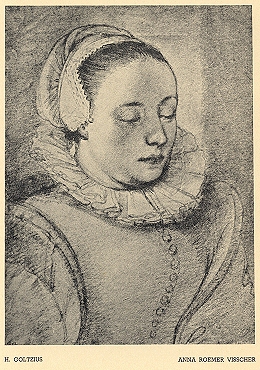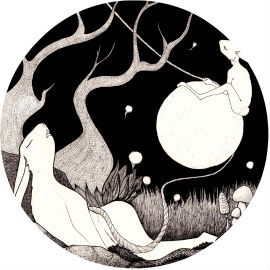The second half of the seventeenth century is known, in the Netherlands, as the golden age of the Dutch republic or – more simply – the golden era. But just prior to this period of increased wealth and prosperity, a group of artists and intellectually met regularly at the castle of Muiden, which is just outside Amsterdam. J M Kruseman’s painting De Muiderkring, of 1852 depicts some of the most famous participants, including the hitorian, poet and playwright Pieter Corneliszoon Hooft, Constantijn Huygens (poet and composer), Dirck Sweelinck, Vondel (playwright), Bredero (poet and playwright) and the sister poets Anna Visscher and Maria Tesselschade Visscher.
Hooft (1581 – 1647) was the most famous member of his circle, and its powerful host. He was the ‘sheriff’ of Muiden from 1609, and the meetings of the circle were held at his official residence, Muiderslot, until his death in 1647. He was a prolific writer, producing an astonishing body of work including letters, poems and plays. From around 1617, however, his focus was on his comprehensive Nederlandsche historiën: a history of the Netherlands focusing in exquisite detail on the 80 years’ war between the Netherlands and Spain. The circle was a social and political home to some of the most influential and talented, if controversial, intellectuals of the era. Hooft and two other members of the circle (Samuel Coster and Bredero) founded the First Nederduytsche Academy in September, 1617. The academy was founded in order to provide high quality dramatic productions, and higher education for commoners. The academy drew a great deal of criticism from the powerful Calvinist preachers of the time, but survived until at least 1665. Two figures that are particularly tantalising are the two women of the circle. The sister poets Anna (2 February 1584 – 6 December 1651) and Tesselschade Visscher (March 25, 1594 – June 20, 1649).
 Anna Vischer |
 Maria Tesselschade Vischer |
Anna and Tessleschade Visscher were the daughters of Roemer Visscher, a highly successful merchant, and a writer. His wealth made it possible for both of his daughters to be well educated, and to participate actively in the intellectual and artistic community of the Netherlands. The sisters were the only women known to have been part of the highly fluid Muiderkring, and both were highly admired by the other members of the circle, though often as muses rather than as artists in their own right. Anna, for example, was described as a second Sappho, or the fourth grace, while her sister Tesselschade was described as beautiful, and as a talented translator of Greek, Latin and Italian texts. Both sisters were also engravers – examples of glass engravings by each of them are held in the collection of the Rijksmuseum.
 Berkemeyer tumbler engraved by Anna Visscher in 1646 |
Detail of glass engraved by Tesselschade Visscher, c.1625-1650 |
Tessleschade, the younger of the two sisters, was a more personal and expressive poet, though even less inclined to publicise her work. Most of her poems were handwritten works of calligraphic elegance, enclosed in personal letters to members of the Muiderkring. In 1634, her oldest daughter and her husband passed away, within a few months of each other. This experience of grief, and how to overcome it, became central to some of her later poetry, and to her personal philosophy of life. When Huygens experienced his own losses many years later she wrote to advise him on how to manage his grief, and again wrote a sonnet on this theme for Hooft when his wife passed away:
| To my Lord Hooft on the Death of Lady van Zuilichem This beacon planted in a sea of mournfulness, A tree that must live on though shorn of trunk and limb, Sends this weak aid for him who flounders, comfortless, Unbearably alone, as waves close in. Tell him, the Constant One, that paper offers kind Support if he can find some words for his distress; Let him stare eagle-eyed into love’s radiance And set his sorrow down to ease his burdened mind. For paper was the weapon that defended me When I felt drawn to death before God’s chosen time; It put my foe to flight and gave me victory. Remind him how he wrote that pain is tamed by rhyme, That grief reined in by rhyme cannot be so fierce. Implore him then to sing in measured, mournful verse. |
Aan mijnheer Hooft, op het overlijden van Mevrouw van Sulecom Die als een Baeck in zee van droefheidt wort gehouwen Geknot van stam en tack, en echter leeven moet, Zeijnt uw dit swack behulp voor ‘t troosteloos gemoet, Gedompelt in een meer Van Baerelijcke rouwen Zeght Vastaert dat hij moght pampieren raet vertrouwen Zoo dinnerlycke smart zich schriftlyck uyten kon, Hij staroogh in liefs glans als Aedlaer in de Son, En stel sijn leed te boeck, zoo heeft hij ‘t niet t’onthouwen Pampier was ‘t waepentuijch waermee ick heb geweert Te willen sterven, eer ‘t den Heemel had begeert, Daer ooverwon ick mee, en deed mijn Vijand wycken, Zijn eijgen lesse leer hem matijghen zyn pijn Want quelling op de maat en kan soo fel niet sijn Besweer hem dat hij sing op maetsangh droevelijcken. |
Anna spent a lot of her literary energy on translations of the works of others, including her father’s famous Sinnepoppen, or Emblems, but Anna also wrote many of her own poems, including the following:
To the highly learned and renowned poet Daniel Heinsuis. After reading on the previous evening his Hymn to our Lord Jesus Christ.
A lover’s heart will suddenly be set ablaze
On hearing how the one he cherishes is praised
As beautiful and good. Such words, like bellows, spark
the embers buried under ashes in his heart.
Oh you who praise my love! Oh Heins whose dulcet songs
Arouse in me such yearning; all my spirit longs
For Christ my Lord. My soul, be mute no more, but raise
Together with this bard a hymn of highest praise
To your dear bridegroom, who will train your rasping voice
To hold the tune of His sweet story and rejoice
In anthems glorifying God. Ah, tear! Burst free
For you provide relief from both my joy and grief.
My heart – so glad recalling thy Benevolence;
My heart – so broken thinking of Thy sufferings
Occasioned by my sins. What praise, what gratitude
Good God, do you require of earth, and dust, and mud?
No more than this: a broken and a contrite heart
That out of deep remorse and pain resolves to start
Anew and (by Thy grace, oh Lord) to follow Him
Who keeps our feet from stumbling into snares of sin.
These are the sacred ponderings, dear friend, that kept
Me occupied till sleep, death’s milder sister, swept
Me off to bed. I dearly wanted to go on.
But she prevailed. By then the clock was striking one.


No Comments